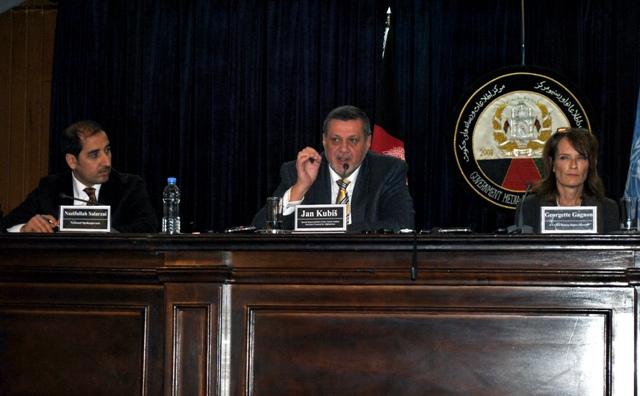KABUL’s armed conflict dropped by 12 percent in 2012, the United Nations said in its annual report on Tuesday.
Assistance Mission in Afghanistan (UNAMA) prepared the Annual Report on Protection of Civilians in Armed Conflict prepared in coordination with the United Nations Office of the High Commissioner for Human Rights.
The UN mission documented a marginal increase in civilian injuries last year, compared with 2011. It recorded 2,754 civilian deaths and 4,805 injuries, saying 14,728 civilians lost their lives over the past six years.
The fall was linked to fewer deaths and injuries of civilians from ground engagement among parties to the conflict and a decline in suicide attacks by rebels, smaller numbers of aerial operations.
But threats to civilians rose due to the presence and re-emergence of armed groups, particularly in the north and northeast regions of Afghanistan, the report said, citing people’s intimidation and interference with their rights to education and freedom of movement at the hands of fighters.
“The decrease in civilian casualties UNAMA documented in 2012 is very much welcome,” said Ján Kubiš, UN secretary-general’s special representative for Afghanistan.
However, he called the human cost of the conflict unacceptable. “Indiscriminate and unlawful use of improvised explosive devices by anti-government elements remains the single biggest killer of civilians.”
In total, 81 per cent of civilian casualties in 2012 were attributed to the insurgents and eight percent to operations by security forces. Eleven per cent of civilian casualties were unaccounted for.
Women and girls continued to suffer from the war, said UNAMA, which said 301 females were killed and 563 others wounded in 2012. “The number of Afghan women and girls killed and injured in the conflict increased by 20 per cent in 2012,” said Georgette Gagnon, UNAMA director of human rights for UNAMA.
The UN mission blamed the militants for 2,179 civilian deaths and 3,952 injuries, an increase of nine per cent over 2011. Improvised explosive devices (IEDs) caused 868 civilian deaths and 1,663 injuries.
In 2012, 316 civilians were killed and 271 injured by government forces, a 46 per cent decrease from 2011. Similarly, collateral damage from aerial operations by international forces also fell by 42 per cent, causing 126 deaths and 78 injuries.
The report said the UN received mixed reports about the impact of the Afghan Local Police (ALP) on civilian protection. The majority of communities from 94 districts with ALP presence reported improvement in the security environment.
But UNAMA found inconsistent compliance with policies guiding the ALP recruitment and vetting process and serious human rights violations committed by ALP in some districts.
Despite government efforts to hold ALP members accountable, the force continued to commit human rights violations with impunity in several areas. The UN asked the Ministry of Interior strengthen local oversight and accountability of the ALP.
The militants were asked to
• Comply with international humanitarian law, including by respecting the principles of distinction, proportionality and precautionary measures, and apply a definition of ‘civilian’ that is consistent with international humanitarian law.
• Enforce codes of conduct and directives that instruct members to prevent civilian casualties and hold accountable those members responsible for violations, including killing or injuring civilians.
• In accordance with international law, immediately cease the deliberate targeting and killings of civilians, and withdraw orders that permit attacks on, and killings of civilians.
• Cease the use of all forms of victim-activated IEDs and prohibit the indiscriminate use of IEDs, in particular, through suicide attacks and placement of IEDs in public places and other civilian locations. Issue directives banning the use of indiscriminate and illegal weapons such as pressure plate IEDs.
• Cease all killings, torture and ill-treatment, and other human rights violations, in particular, passing and carrying out death sentences through parallel judicial procedures.
In an effort to cut civilian casualties, the Afghan government was urged to
• Increase efforts to train, resource and provide all necessary support to Afghan National Security Forces to enable them to effectively protect civilians.
• Promote and support accountability through establishment of a permanent government body representing relevant security bodies with powers to investigate and respond to incidents of civilian casualties.
• Prioritise implementation of the counter-IED strategy with efforts aimed at further developing and resourcing ANSF capacity to command, control and effectively conduct counter-IED operations, IED-disposal and exploitation.
• As the ALP programme expands, strengthen vetting, recruitment, oversight and accountability mechanisms including through prosecutions and in cooperation with local communities, particularly at the district level, to prevent human rights violations, ensure accountability and better protect communities with the support of international military forces and donors.
• Disarm and demobilize all non-State armed groups and take measures to provide accountability for human rights abuses carried out by these groups.
Recommendations to international forces
• Continue reviewing tactical directives and operational procedures relating to offensive aerial operations, in particular, review of criteria required to establish positive identification and determination of status prior to targeting. Continue to conduct post-operation reviews and investigations in cooperation with the Afghan Government in cases where civilian casualties have occurred.
• Continue support to ANSF to ensure they are sufficiently resourced, trained and equipped to command, control and effectively conduct counter-IED operations and IED-disposal, including IED exploitation.
• Increase support to efforts of the Government of Afghanistan to mitigate, track, investigate and ensure accountability for civilian casualties.
• Continue to promote transparency, accountability and better relations with affected Afghan civilians and communities through the prompt and public release of all ISAF findings on incidents involving civilian casualties, follow-up accountability and disciplinary measures and systematic provision of compensation and other forms of reparation as appropriate.
mud
Visits: 3









GET IN TOUCH
NEWSLETTER
SUGGEST A STORY
PAJHWOK MOBILE APP